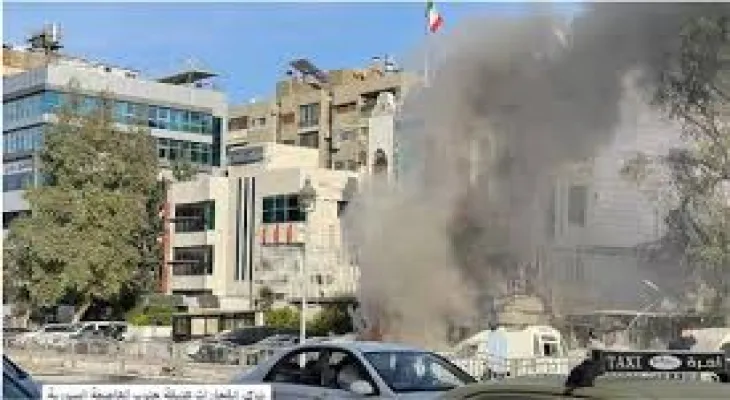Search here
Newspaper
Search here

Arab Canada News
News

Published: April 7, 2024
A senior Iranian military advisor warned on Sunday that none of Israel’s embassies are safe anymore after an airstrike in Damascus last week blamed on Israel that killed 12 people, including two Iranian generals, and regional tensions threatened to drag the Middle East into a wider conflict six months into the Israeli war against Hamas.
Israel was preparing for an Iranian response to the airstrike without directly admitting its involvement, and General Rahim Safavi’s statements indicate that an attack on a diplomatic mission could be met with a similar response.
The semi-official Tasnim news agency quoted Safavi, the military advisor to the Iranian Supreme Leader Ayatollah Ali Khamenei, as saying, “None of the regime’s (Israeli) embassies are safe anymore.”
Safavi spoke at a memorial ceremony held in Tehran for Iranian Revolutionary Guard generals killed in the airstrike that destroyed the Iranian consulate building in Damascus.
For his part, Israeli Prime Minister Benjamin Netanyahu said Israel was ready for any response.
He explained during a cabinet meeting: "Whoever harms us or plans to harm us, we will harm them; we follow this principle in practice, all the time and also in recent days."
The escalating regional tensions came six months after the war, which broke out when Hamas militants from Gaza attacked Israel, killing 1,200 people, mostly civilians, and capturing about 250 people. Israel responded with heavy bombardment and a ground offensive that killed more than 33,000 Palestinians, mostly women and children, according to local health authorities.
On Sunday, the Israeli army announced the withdrawal of its 98th Paratroopers Division forces operating in the Khan Yunis area south of the Gaza Strip, which has been Hamas' main stronghold and the focal point of the Israeli offensive in recent months.
This brings the level of Israeli forces in Gaza to its lowest since the start of the war, raising questions about plans to continue the war, especially the fate of Rafah city located in the far south of the Gaza Strip.
Israel says Rafah is Hamas' last stronghold and the war will not be complete until Hamas is eliminated. But the area now shelters about 1.4 million people, more than half of Gaza's population. The prospect of an Israeli attack raised global alarms, including from its major ally the United States, which has demanded to see a credible plan to protect civilians.
It was unclear how the intensity of the war might change. Israel maintains forces in the devastated northern Gaza and can send them south as needed.
Six months into the war has been met with growing frustration in Israel, where anti-government protests have swelled and anger has risen over what some Israelis consider government inaction to help free nearly 130 remaining hostages, about a quarter of whom are believed likely to be killed by Israel.
Negotiations are expected to resume in Cairo on Sunday seeking a ceasefire in exchange for the release of the hostages, as pressure mounts to act now.
In a statement marking six months of the war, the International Federation of Red Cross and Red Crescent Societies said, "Humanity has been abandoned" in Gaza.
The United Nations and its partners now warn of an “imminent famine” for more than a million people in Gaza while humanitarian workers urge Israel to ease restrictions on land aid deliveries, the only way to meet increasing needs as some Palestinians search for weeds to eat.
Mothers who have given birth in Gaza since the start of the war are particularly at risk.
The Gaza Ministry of Health said that bodies of 38 people killed in Israeli bombardments were transferred to the remaining operational hospitals in the sector over the past 24 hours. It added that hospitals also received 71 wounded.
The ministry said that 33,175 people have been killed since the war started. The ministry does not differentiate between civilians and combatants but says two-thirds of the dead are children and women. Another 75,886 have been injured.
The Israeli army continued to suffer losses, including in Khan Yunis, where the army said four soldiers were killed in a battle with militants.
More than 600 Israeli soldiers have been killed since October 7, including 260 in the ground operation in Gaza, according to the Israeli government.
Comments